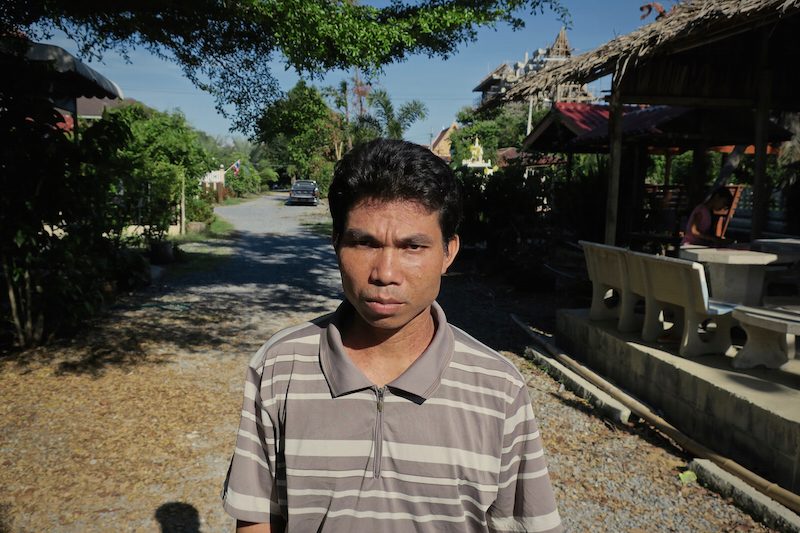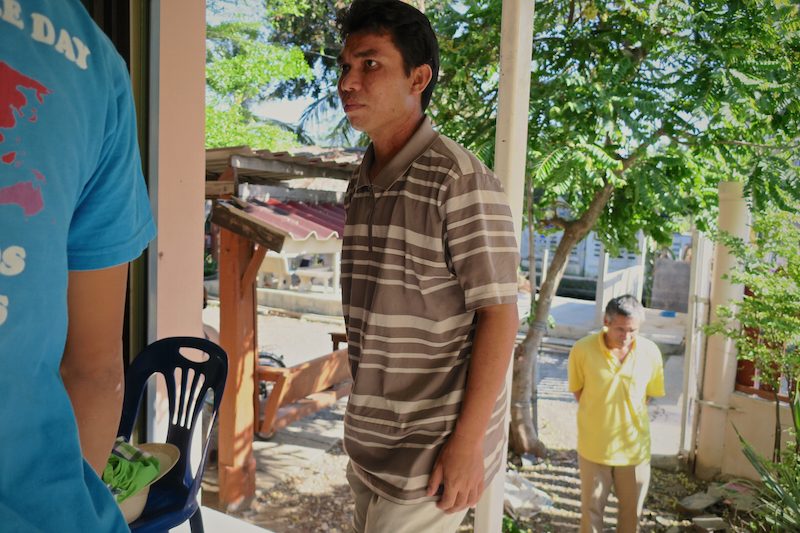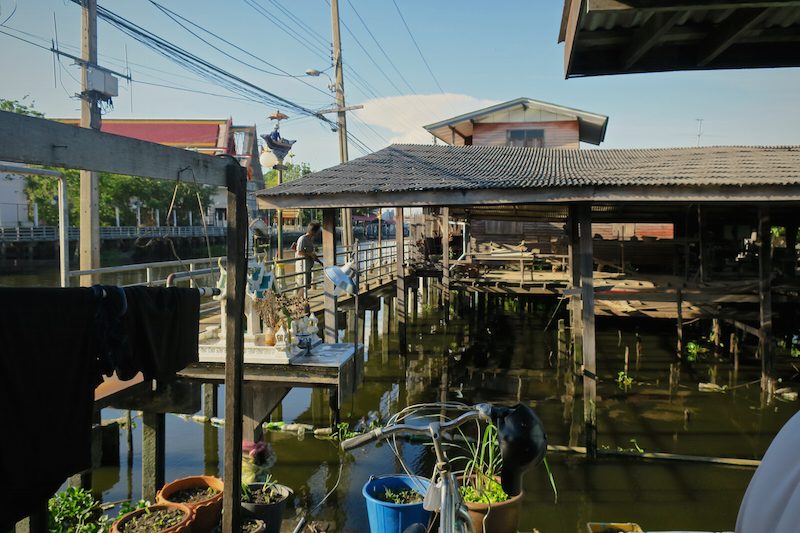Bangkok – In a far-flung district of Bangkok, surrounded by winding streams and rickety walkways, Kpa Hung is hiding out, one of dozens of Montagnards who fled across the border from Cambodia last month to avoid almost certain deportation to Vietnam.
“After I received a lot of pressure from the police and they stopped letting us out, I decided to go,” Mr. Hung said last week inside a safe house with about 20 other would-be asylum-seekers who had been living in Phnom Penh.

“I told them I was going to buy vegetables and I escaped on March 29. There were six of us. I went to the market and because I speak Khmer, I asked a tuk-tuk driver to organize a bus to take us to Poipet,” he said.
The group camped out in the forest near the border before a fixer slipped them into Thailand and a car took them to this suburb, where hundreds of stateless Montagnards are waiting for their refugee applications to be processed.
Mr. Hung is among more than 50 Montagnards who fled over the past month from the Cambodian capital, a place they had thought would be a refuge from what they claim was widespread persecution and surveillance in the Central Highlands of Vietnam.
After being pent up in accommodations for months, or in some cases years, wading through the slow slog of the refugee process—watching others be rejected and returned to Vietnam to face potential maltreatment—the group decided to cast their lot elsewhere.
Oppression Claims
All of the Montagnards who met with the The Cambodia Daily in Bangkok last week claimed to have been subjected to oppression, intimidation and abuse at the hands of the Hanoi government, including for their form of Protestantism, which is not officially sanctioned, and for their affiliation with the U.S. during the Second Indochina War.
“In Vietnam, there is no God. Only Ho Chi Minh is God. They claim that you don’t really follow God, you just follow the Americans,” Mr. Hung said.
“They would listen in and follow you. If you go to church they follow you and then destroy the church by knocking it down.”
Mr. Hung, who was born in 1975, said he was jailed three times for his role in protests seeking the protection of the Montagnards’ human rights and freedom of religion.
“They beat me all over my body and they taunted me. They would shout, ‘If you believe in God, you can call on God, America, Kok Ksor and the U.N. to save you,’” he said. Kok Ksor is a reference to the U.S.-based head of the Degar Foundation, a controversial group that purportedly fights for Montagnard rights, but faces accusations of operating like a cult.
Another man, who, like all others interviewed, declined to be named for fear of jeopardizing family and friends still in Cambodia, said he was sentenced to six years in prison in 2008 after being accused of being a member of United Front for the Liberation of Oppressed Races (FULRO), a separatist movement made up of hill tribes that laid down arms in the early 1990s.
“When I went to trial, my family didn’t know. They beat me in the courtroom because I sat in the wrong chair,” he said, adding that he was later put under house arrest.
“They did this because I am a Christian. They think I am FULRO and my family participated in the war on the American side.”
The final straw came when he was forced to spy on his own people and file two reports a month to local authorities upon his release, he said, pushing him to flee through the jungle into Cambodia in July 2015.
Dire Conditions
After crossing the border, many of the Montagnards making the journey hid from police attempting to root them out in Ratanakkiri province before being taken to Phnom Penh with the assistance of the U.N.
Upon meeting Cambodian authorities, they said, it became clear that they were not going to be welcomed with open arms. Saying they were allowed minimal freedom of movement while in their U.N.-funded temporary accommodation in Pur Senchey district, Mr. Hung claimed their treatment bore similarities to the dire conditions he fled.

“There was a lot of pressure. I felt as if I was back in jail in Vietnam. They were just keeping me there to send me back,” Mr. Hung said.
“They would come to the house and I tried to tell them that I had been in jail in Vietnam, but they said that it doesn’t matter if you were in jail or not, you’ll be treated the same as someone who has not been in jail,” he said.
Vietnamese officials even visited them last year, and despite their initially appearing cordial, things turned sour once the group attempted to negotiate for the release of jailed Montagnards in Vietnam, he said.
“All these [Montagnards] said: ‘If you want us, you must release all these people.’ They got really angry,” he said.
A younger member of the group, sporting a Manchester United football jersey, argued that the Cambodian government wanted to return the Montagnards to their oppressors across the border because Hanoi still wields power over Prime Minister Hun Sen’s government, echoing a frequent accusation by the CPP’s political foes that the ruling party remains a puppet of the Vietnamese government that installed it in the 1980s.
“I think because of the war in 1979, Vietnam helped Cambodia. Now, in 2017, lots of Vietnamese say: ‘You owe us, so you have to repay us for the past. Send them back to us,’” he said.
“Vietnam and Cambodia are friends. Vietnam and Cambodia are the same country.”
Asked why the Communist Party of Vietnam seems so intent on having them back on Vietnamese soil, he said it was an effort to avoid international criticism.
“Vietnam doesn’t want to lose face and the world will start saying there’s no human rights and democracy in the country,” he said. “The Montagnards who escaped will tell everyone about what Vietnam has done to us and will report it to the U.N.”
Phil Robertson, deputy Asia director for Human Rights Watch (HRW), also said the Cambodian government appeared keen to appease its bigger neighbor.
“Cambodia doesn’t really care much [about] the Montagnards, but they do care alot about doing favors for Hanoi and not getting called out for it by the U.N.,” Mr. Robertson said in an email.
“Those competing desires explain the zigs and zags between protection and rights abuses of the Cambodian government towards these refugees.”
Interior Ministry spokesman Khieu Sopheak said he could not comment on the current situation of the Montagnards in Phnom Penh, but said the government had simply been following the same vetting process for granting refugee status that other countries use.
General Sopheak said the Vietnamese government was “very open” to allowing international observers to check on the Montagnards’ situation, in contrast to reports of Hanoi blocking journalists and NGOs from operating in the Central Highlands.
“When they are ready to go home to Vietnam, authorities open the door to observe…whether they face harassment or not,” he said.
“After they return home, they always open the door for journalists, diplomats or the UNHCR,” he added, referring to the U.N.’s refugee agency. “If you want to visit, you can go.”
UN Role
The role of the UNHCR as it pertains to the Montagnards in Cambodia has been complex.
Although it has supported the asylum-seekers during their time in Phnom Penh, rights groups have criticized the agency for assisting the government in repatriating Montagnards to a country where there is evidence of widespread persecution.
The agency has claimed in the past that the Vietnamese government had assured “verbally and in writing” that returning Montagnards would not face punishment, and that it only facilitates the return of those who voluntarily choose to go home.

It follows up with those who have been sent back, and generally claims to have found no evidence of retaliatory persecution against returnees.
Those interviewed in Bangkok said this was not the case, and that UNHCR involvement had made some situations worse.
“Six people went back and got beaten by police. The Cambodian government and U.N. promised that nothing bad would happen, but when they got back they got beaten,” said the young man in the football jersey.
“They reported it to the U.N., who called the Vietnamese police, who then returned and confiscated the guy’s phone,” he said.
“What we hear from the U.N.—that’s not true.”
Vivian Tan, the UNHCR’s regional spokeswoman, reiterated that the agency had followed up with most Montagnards whose returns it had helped facilitate since late 2014, and had yet to encounter any substantial problems.
“They have reported the resumption of their livelihoods—mainly in farming—and that they are managing amid pre-existing challenges linked to poverty and underdevelopment,” Ms. Tan said in an email.
Mr. Hung said the UNHCR was being pressured into assisting with repatriating Montagnards, and that its hands were somewhat tied.
“I think the U.N. cares about people, but it has no power because the control is held by the Cambodian government,” he said.
“Vietnam is the tiger, the Montagnards are the sheep, so the Vietnamese are not going to leave the sheep alone. The U.N. has no choice, but I wish they would try to show a little more care,” he added. “They could be doing more than they are doing now.”
Mr. Robertson of HRW said the UNHCR’s checkups on the Montagnards once they have helped repatriate them do little to help their plight.
“Human Rights Watch remains quite skeptical about the ability of the UNHCR or any international agency to effectively monitor and protect Montagnards sent back to Vietnam because of the serious restrictions on access to those areas by outsiders,” Mr. Robertson said in an email.
“Periodic visits by international staff do little to disrupt the web of state surveillance and intimidation that weighs down Montagnard returnees and keeps them living in fear of arbitrary arrest or worse.”
The UNHCR should be doing its utmost in “pressuring Hanoi to cease its campaign of religious and political persecution of the Montagnards” and pushing for more international observers in the region, he said.
Safety in Thailand
For Montagnards avoiding a return to Vietnam at all costs, fleeing to Thailand is a safer bet than seeking assistance in Cambodia, said Grace Bui, program director for the Montagnard Assistance Project, which is providing assistance to the group in Bangkok.
“Even though they’re illegal, the [Thai] police and the immigration [officials] don’t bother them unless the get caught working illegally and then they can be arrested. But we can bail them out if we have the money,” Ms. Bui said in Bangkok last week.
“The police don’t usually arrest them and whenever the police patrol the place, the U.N. will let us know and they’ll say, ‘Stay inside your house, lock your doors and don’t go out on that day,’” she said.
Despite the escapees claiming to be fearful of arrest, the group appeared relaxed when walking through their local community of stilted houses above canals and rivers, smiling and greeting their new neighbors. They could face a long wait to be assessed by the UNHCR for refugee status due to a severe shortage of interpreters in Jarai, most Montagnards’ common tongue.
Some Montagnards have been in Bangkok for a decade, fleeing Vietnam through Laos or Cambodia. But Ms. Bui said she was unaware of any forced repatriations to Vietnam, even as some have had their applications for refugee status rejected. Many work on construction sites outside the city for a fraction of the rate of their Thai counterparts, sometimes going unpaid after their bosses learn they are in the country illegally, Ms. Bui said.
Cult of Ksor
All Montagnards interviewed said they had no concrete goals regarding third countries for resettlement, but were putting their faith—to varying degrees—in the U.N., God and Mr. Ksor, the mythic head of the Degar Foundation.
Based in Spartanburg, South Carolina, Mr. Ksor is a controversial character. Many Montagnards, including some interviewed last week, see him as a savior who will one day relieve their suffering and help them secure an autonomous region in the Central Highlands.
“I support Kok Ksor because he’s a Montagnard. He just said to keep praying, and that people will hate you wherever you go, but you just have got to keep praying. Montagnards are not well educated, don’t dream of another country. Just pray. God is real, God is great and there is only God,” Mr. Hung said.
Others were quiet when asked about Mr. Ksor in front of Mr. Hung, who interacted with the others as if he was their leader, often speaking for them. (A man with the same name was identified by Vietnamese state media as a Montagnard “ringleader” who had been arrested during a 2004 crackdown.) Ms. Bui, who witnessed the interviews, said they later told her in private that they were not followers of Mr. Ksor.
Ms. Bui likens Mr. Ksor to a cult figure, and claims many Montagnards have wasted years waiting for his assistance, which never comes.
“They’re waiting for him to come for them and also to take over the land in Vietnam because he promised them a country. However, some people waited for four or five years and they didn’t see anything, but they still believe in him,” Ms. Bui said.
“To me, it’s like a cult and why do so many people believe in cults? It’s the same thing. Personally, I think he manipulated them,” she said.
Mr. Ksor did not respond to an emailed request for comment.
Uncertain Future
Since the recent exodus, conditions have become even tougher for the Montagnards in Cambodia, according to those in Bangkok who have contacted some of the remaining 100 in Phnom Penh.
Before the recent group of 50 fled in March, they were free to visit local markets. Now, there are registration drills at 7 a.m., midday and 7 p.m., sometimes conducted in the presence of Vietnamese officials, they said. This situation could not be confirmed.
Some said the Montagnards in Phnom Penh are no longer permitted to leave their apartments, while others claimed they were being allowed out for short periods, but must sign out and have their photo taken.
A Montagnard couple—a pregnant woman and her husband—have been placed in custody in Phnom Penh in preparation to be deported to Vietnam. While immigration officials claim they have deemed the pair to not be Montagnards and accuse them of trying to flee to Thailand, Ms. Bui said they were detained at their apartment over fears they planned to join a relative who recently came to Bangkok.
With eventual deportation back to Vietnam almost certainly on the cards for the majority of Montagnards in Phnom Penh, the young man in the football shirt said the treatment of his people in Vietnam and Cambodia was similarly dire. But being forced to return to the Central Highlands could bring especially ominous consequences.
“When you’re in Vietnam, the government oppresses you. Then in Cambodia the government does the same. So you’re just living in the same country all over again,” he said.
“But we all know what we face if we return to Vietnam. Those with no education will be OK, but those with education could disappear.”




